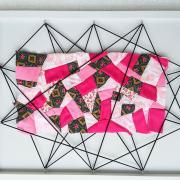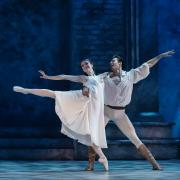Sir Alan Ayckbourn makes an unusual appearance at the Stephen Joseph Theatre in Scarborough. Tony Greenway joins the audience

How about this for a great knight at the theatre? On to the stage, to rapturous applause, walks Sir Alan Ayckbourn. If you had written 80 plays and been fêted from Stockholm to Sydney as the UK’s greatest living playwright, you might be tempted to bask in the white heat of the adulation for a while. Not Sir Alan. He’s far too modest for that.
Ayckbourn is walking with the aid of a stick and moves slowly but determinedly – he’s 77 and has had well-documented health problems – but it quickly becomes apparent that his mind and humour are as sharp as they ever were. He’s at the Stephen Joseph Theatre in Scarborough, where he was artistic director for 37 years, to be interviewed by broadcaster and novelist Kate Fenton for what is billed as a Tea Time Talk. Sir Alan beams at the audience, sits down and – while Fenton says some nice things about him by way of introduction – suddenly finds the floor fascinating.
Fenton makes the point that Ayckbourn ‘has reached an age and a stature where he could be forgiven for taking it easy’: this is, after all, his 55th year as a theatre director and his 57th as a playwright. Apart from his 80 plays, he’s also written 11 revues, five one act plays, five adaptations, one screenplay, one narrative for voices, one book and a number of other miscellaneous works.
Ayckbourn’s career has been both constant and constantly acclaimed, and his works include the perennially popular Relatively Speaking, How the Other Half Loves, Absurd Person Singular, Bedroom Farce, A Chorus of Disapproval and The Norman Conquests. He remains a theatre animal, one who famously thrives on staging his work ‘in the round’ (the SJT was the first theatre in the round in Britain) and rarely diverts into film and TV. His plays have been translated into more than 35 languages and transferred to the West End and Broadway, although they almost always premiere at the SJT in Scarborough. He’s been inducted into American Theatre’s Hall of Fame, received the 2010 Critics’ Circle Award for Services to the Arts and became the first British playwright to receive both Olivier and Tony Special Lifetime Achievement Awards. He received his knighthood in 1997.

Anyone looking back over a CV like that might think: mission accomplished. Yet Ayckbourn is emphatically not slowing down. Actually, he might even be speeding up. Take this summer at the SJT, for instance. He directed both a revival of his 1987 play Henceforward and a new production (an enigmatic Hitchcock tribute in two parts) called Consuming Passions, which was first performed in the SJT Bistro.
He also unveiled The Karaoke Theatre Company, a sort of spoof cabaret which blends his tightly scripted words with skittish improv from a troupe of performers (all played by actors), topped off with a large chunk of audience participation. Plus, this Christmas, he pulls back the curtain on his latest play, No Knowing, a comedy about a couple celebrating 40 years of ‘safe, unspectacular, ordinary marriage’ – although their son and daughter know differently. He doesn’t say much about this, other than confirming that, while he has a reputation for delivering scripts to actors at the very last minute, the play is actually written and ready to go.
Ayckbourn’s love of live theatre is obvious but he says: ‘You feel a bit neglected in the theatre, so we sit down as a company and say: ‘What are we doing this for?’ And the answer is: ‘Because it’s live.’ It’s a unique thing. So Karaoke is an attempt to push that uniqueness to its furthest limit. It’s really 50 per cent audience involvement.’
Not everyone who comes to the theatre wants to be dragged up on stage to take part though. Ayckbourn knows the feeling and wistfully remembers, at the age of four, biting a clown who was attempting to cajole him to join in with a circus act. ‘I know how reticent some people are to get involved,’ he says. ‘So (Karoake) is an attempt to cater for those people, as well as the ‘Mr and Mrs Show-offs’ in the audience – and there are always a few... at least, we hope there are – who will bound up and take over one of the roles.’

The Karaoke Theatre Company is not everyone’s cup of tea, as the SJT has discovered. Reviews have been mixed, but perhaps some critics didn’t get the joke. ‘But what’s nice is that we have a lot of much younger audiences coming in to see it,’ says Ayckbourn. And theatre needs young crowds. At the Tea Time Talk, the average age of the audience is, I’m guessing, 65; but then it is 4.30 in the afternoon in Scarborough.
Ayckbourn talks a bit about the inspiration for the material in his plays, some of which comes from his own life experiences. He’s not averse to using snippets of conversations and occasional phrases from his ‘nearest and dearest’ as dialogue; although he does feel ‘a twinge of guilt’ when he hears those words being said back to him by actors on stage. ‘Because you think that’s something lost between us,’ he says. ‘But I think writers are magpies. And in my defence, most of my characters are me, or aspects of me which I have mined and mined over the years.’ He pauses. ‘I’m suddenly feeling like a large, hollow cave. I’ll fall into myself and implode and just be a pile of rubble.’
This method of working only makes Ayckbourn’s characters appear more real and recognisable, however. ‘Swift said: ‘Satire is a mirror in which people see everyone’s faces but their own.’ It’s interesting: a lot of people don’t recognise themselves. I’ve heard couples at my plays saying: ‘I don’t know anyone like that!’ To which the reply comes: ‘Yes you do, darling! Your mother is exactly like that!’’
He has a recurring nightmare where the doorbell rings and all the characters he has ever written – including some ‘complete monsters’ – want to come in. He wouldn’t let many over the threshold, he says, but he knows they’re essential to move his plots forward. He’s regularly asked why his characters are often in such poor relationships, and Ayckbourn always replies that it would be boring if they weren’t. ‘No one wants to spend an evening watching happy couples sitting smiling at each other and saying: ‘Hasn’t this been a great life?’’ I heard one man leave one of my plays saying: “Well, I thought our marriage was bad until I saw that.”
Time for audience questions. A woman asks him if he’s going to write a sequel to Consuming Passions, (he’s not planning to); and if he had to change parts of 30-year-old Henceforward (which is set in a dystopian near future) in order to reflect today’s state-of-the-art technology. ‘We have moved so fast in that direction,’ he agrees. ‘Society hasn’t moved much. It just staggers on.’ A man asks if he thinks Henceforward is his darkest play. ‘Oh no! I don’t think so,’ he says with glee. ‘I’ve got some other dark ones. You ain’t seen nothing yet!’
And with that, Sir Alan gets up, gives a brief wave and walks off to even bigger applause, without looking back. Despite the stick, he looks like a man in a hurry. One with another play to write.



























